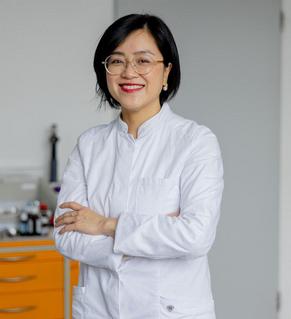Profile
- Name:
Dr Nguyễn Thị Diễm Hằng
- Professional background:
Medical doctor with specialisation in ear, nose and throat
- Place of assignment:
Hospital for Orthopaedics and Rehabilitation in Đà Nẵng, Central Viet Nam
- Duration of assignment:
2 weeks

My plan was to study medicine in Germany and go back to Viet Nam to work as a medical doctor. However, the circumstances in Vietnamese health care facilities were and are so difficult, that I decided to stay in Germany. For me, treating young children with facial deformities in Viet Nam on a regular basis is not only an act of humanity, I also want to give something back to the country I was born in.Dr Hằng is part of a German-Vietnamese non-profit organisation DEVIEMED that has provided medical aid for thousands of people in central Viet Nam for almost three decades. The majority of the organisation’s patients are small children who, as a late consequence of the Viet Nam War and the defoliant used there, were born with complex facial deformities that impair vital activities such as breathing, speaking, eating, seeing, smelling and tasting. Since many healthcare facilities in Viet Nam lack specialist doctors, a huge number of children with facial malformations don’t receive the necessary surgical treatment that would allow them to lead a normal life.
In the mountain regions of central Viet Nam, children with facial deformities are particularly disadvantaged due to limited access to healthcare services. The reasons for this are manifold. Poor infrastructure, a high level of poverty, understaffed and underequipped health facilities are some of them. The Orthopaedic and Rehabilitation Hospital in Đà Nẵng is located in central Viet Nam. This is where Hang and other medical specialists provide free treatment and surgeries for young children with facial deformities. Through training courses, Dr Hằng and her DEVIEMED colleagues support this and other health institutions in Viet Nam by upskilling their doctors, future doctors and nurses in the treatment of facial deformities. Dr Hằng and her organisation also arrange medical equipment for Vietnamese hospitals and provide essential items, such as hearing aids, for young patients to lead as normal a life as possible.
Many people living in the mountain regions of central Viet Nam have to travel for several hours to reach the nearest hospital. Their native language is usually not spoken there, and the treatment costs are often unaffordable. Sometimes, they can't even cover the transportation expenses. It's really disheartening to see how rural areas in Viet Nam still face such disparities. But what makes me happy is receiving a bouquet of flowers from grateful parents.
Further information on the offers available to the Vietnamese diaspora can be found below.